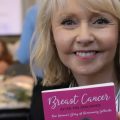The major life stage is long overdue for a rebrand.
by Jessica Wortsman // Illustration by Shelagh Armstrong-Hodgson
Menopause is having a moment.
What was once only mentioned through the whisper network of mothers, sisters and girlfriends is now trending on social media feeds and headlining stories in The New York Times and Vogue.
It’s about time. Menopause is experienced by half the world’s population, yet the culture of silence around it has left many women* blindsided by the changes happening in their bodies.
Worse still, many aren’t getting the help they need from their doctors, who often lack the expertise and time to treat them properly. The ramifications of this are huge and impact not just women’s health but relationships and careers as well.
“Menopause is when the ovaries say, ‘I think I’m going to retire now. We’ve made hormones all our life, we’ve ovulated. I think we’re good.’”
Dr. Kara Dionisio,
naturopathic doctor
A 2022 survey by the Menopause Foundation of Canada paints a pretty grim picture. Women suffering with menopausal symptoms are often dismissed or undertreated by their doctors.
For many, their discomfort and distress have taken a toll on relationships with partners and children. Of those struggling with symptoms at work, most don’t seek the support of employers for fear of being stigmatized. Others step completely out of their careers, often as they’re peaking, because they just can’t cope. Almost half of women enter perimenopause completely unprepared and feeling lost, lonely and ashamed.
With the current media spotlight on menopause, that may all be about to change. Riding the tidal wave of voices speaking out on the issue is the opportunity finally to give this unpopular life stage an image overhaul, something the nearly one billion menopausal women worldwide could very well seize.
Going in Blind
“We would never send our teens into puberty blind,” says Dr. Kara Dionisio, a naturopathic doctor in Owen Sound. “We would never send someone into pregnancy without knowing what to expect. There is education and support around these life transitions. With perimenopause, women are going in blind, for the most part.”
Dr. Kara, as she is known, has a clinical focus in women’s midlife hormone health and is a NAMS (North American Menopause Society) certified menopause practitioner. She is one of fewer than 1,500 healthcare professionals in the world to have this designation. And that’s the crux of the problem right there.
Our healthcare system is not set up to help women through menopause. Family doctors leave medical school with a lot of knowledge about sickness and disease but very little about midlife hormone health. It doesn’t help that the fee-for-service pay model for Canadian doctors encourages quantity of patients over quality of care. This “one issue per visit” appointment system is rarely enough to tease out the multitude of ways the menopausal transition can
affect women.
“It takes so much time to deal with such a complex and nuanced issue,” says Dr. Gillian Yeates, an obstetrician-gynecologist in Collingwood, who must sometimes see patients several times before getting to the root of their concern. “Not every doctor is willing to put the time and effort into figuring this out. It takes time, and time doesn’t pay.”
Menopause care is about more than just managing severe symptoms too. The decrease in hormones impacts a woman’s health in several key ways, from increased risk of osteoporosis and heart disease to recurring UTIs and incontinence. Says Dr. Kara, “Just like you plan for retirement, you invest in your RRSPs, you have to plan for your health for the next 50 years.”
Less than a third of women surveyed by the Menopause Foundation of Canada reported their doctor had spoken to them proactively about perimenopause. Worse yet, of the 40 percent that did seek their doctor’s advice, three quarters found it to be unhelpful.
That was British Columbia resident Shirley Weir’s experience. Back in 2012 and in her forties, Weir began suffering from brain fog, anxiety, depression and poor sleep. Underwhelmed by her doctor’s help, she went in search of her own answers, and made the decision to share what she learned online. Her blog, Menopause Chicks, quickly gained a following because, at the time, no one else was talking about menopause.
Fast forward ten years and the blog has blossomed into a Facebook community with over 47,000 members, all eager to connect and learn about their midlife health. It’s in this space that Weir also runs workshops and seminars, bringing together specialists from all areas of women’s health to share their knowledge.
Dr. Kara Dionisio of Owen Sound—one of relatively few healthcare professionals focusing on menopause.
The Right to Relief
We have a certain cultural tolerance for female suffering. Through periods, pregnancy and post-partum, women are told that their discomfort is “just part of being a woman.” Menopause is no different. We can trace the knowledge gap in the medical community to this very idea—that menopause is something women must endure—and it’s left women underserved.
And while some women sail through menopause, others develop health challenges ranging from bothersome to debilitating. For those women, left to navigate this period alone, there are two choices. Some suffer in silence while others explore remedies—acupuncture, supplements, cannabis, cognitive behavioural therapy (CBT) and vaginal lasers are just some of the options. The efficacy of these treatments is hard to measure, and is often more anecdotal than evidence-based, but relief is relief, even if only imagined.
The real kicker is that there actually is an effective, science-backed treatment available—menopausal hormone therapy—but many doctors don’t prescribe it. For decades, hormone therapy was the gold-standard treatment for some of menopause’s most troubling side effects, like hot flashes, vaginal dryness and night sweats, but a 2002 Women’s Health Initiative (WHI) study linking it to diseases like breast cancer and stroke scared everyone off. A re-analysis of the data now shows that the original study was both flawed and misunderstood, and that for many women (age, medical history and time since menopause considered), risk is often greatly outweighed by benefit. But many doctors remain too gun-shy or uninformed to offer their patients the relief they deserve.
Explains Dr. Yeates, “After the WHI study, medical students were taught that hormone treatment was bad—end of story.” Funding for menopause research stopped too, and as a result, she says, doctors are now hard-pressed to find any information on menopause treatment unless they are looking for it independently (through continuing medical education).
“I think we’re at the stage where women are further ahead than healthcare,” says Dr. Kara. “Women are now showing up at their healthcare providers armed with information about menopause and looking for care and answers that they just aren’t getting.”
Nothing to Hide
Menopause has suffered bad PR. To understand why, we have to untangle its roots, which are deeply embedded in some dark and heavy stuff like patriarchy, misogyny and another of our cultural taboos—aging. Essentially, it comes down to this: historically, a woman’s worth was weighed largely against her beauty and fertility. Once she lost those, she became irrelevant.
Not much has changed. (Just google CNN anchor Don Lemon and “past her prime” if you want to rage-read.)
“Many women have been conditioned to fear menopause as an expiration date for relevance and as a sign of weakness only because that is what men thought,” says Canadian obstetrician-gynecologist Dr. Jen Gunter in her book The Menopause Manifesto.
It’s what women think too, at least when it comes to menopause in the workplace. In fact, a series of studies conducted by Penn State professor Alicia Grandey revealed that women experiencing visible menopausal symptoms in the workplace are viewed (equally by both men and women) as less confident and less emotionally stable. Sigh. But there is good news. The studies went on to discover that when those women disclose that their symptoms are a result of menopause, the perception of them completely flips. The act of sharing their menopausal status, of explaining they are having a hot flash as opposed to just feeling warm, makes them seem more confident, stable and leader-like.
That’s precisely what Jen Harding is counting on. Harding, a vice president at a big Canadian bank, is no stranger to the workplace hot flash, though her perimenopausal struggles lay more in brain fog and word recall.
“I know I talked about something last week. I know we made a decision in the meeting. And I’m sitting in a follow-up meeting, and I just can’t remember. It’s just gone,” she says.
Harding works in a very traditional, corporate setting and spends a good deal of her workday speaking to teams of people. For her, forgetting words or information can be hard to conceal.
Her strategy for managing these symptoms at work is honesty.
“I have to say to my colleagues, ‘I know we talked about this last week, but can you please refresh my memory? I’m dealing with some brain fog today.’ My team now knows they have to do that.”
Harding is also using her experience to educate colleagues. She wrote an article about what it’s like to contend with perimenopause at work and chose to publish it on both a professional platform and an internal corporate blog. Despite some initial reservations about going public, she knew it was the only way to help normalize the experience and promote a more menopause-inclusive workplace.
“The only way to break this taboo is to keep talking about it,” she says.
“It takes so much time to deal with such a complex and nuanced issue.”
Dr. Gillian Yeates,
obstetrician-gynecologist
Cultural Shift
This is the shift taking place. Women are finally taking charge of the menopause conversation and busting the stereotype of the aging woman. An encouraging number of famous women over 50, including journalist Lisa LaFlamme, model Paulina Porizkova and actress Andie MacDowell, are proving the sophistication and sex-appeal of grey hair and wrinkles don’t belong solely to men. Heavy hitters like Michelle Obama and Oprah Winfrey are using their platforms to start a discourse around menopause and share their experiences, while other celebrities, like Naomi Watts and Gwyneth Paltrow, are putting their money where their mouth is by investing in menopause-specific skincare brands and health startups.
Of course, the menopause bandwagon (meno-wagon?) comes with some pitfalls. Women in search of guidance through their menopausal journey will find no shortage of online “experts” with advice on diet, lifestyle and treatments. And while access to more information is a good thing, not all information is actually good.
Dr. Kara warns that there is so much noise out there on the subject, so much judgment and misinformation that it’s important to sift through it all with a qualified professional.
Weir adds that, “More conversations about menopause won’t work if they continue to perpetuate myths and misinformation.”
It’s also wise to be wary when there is money to be made, and menopause is going to be a big moneymaker. The global menopause market was valued at US$16.1 billion in 2022 and is expected to reach US$24.4 billion by 2030. There will be many hands vying for the menopausal woman’s buck.
Changing the Narrative
The rebranding of menopause is underway and the message is clear. It’s enough with the silence and the shame. It’s also enough with the suffering. There is help for those who need it, though access to it should be less tricky. It’s time to remind women that menopause is not just an ending, but also a beginning—the beginning of the second half of their lives. It’s a time when women can finally put themselves first and take stock of their midlife health. It’s a time to enjoy their wisdom and hard-earned wins. Menopause also comes with a lot of freedom, best of which just might be the freedom from the physical, emotional and financial burden of a monthly period (“Can’t wait for my next period!” said no one, ever) and of course, the freedom of sex without fear of pregnancy.
It’s up to women to change the narrative and maybe they just will, because the story
of menopause is one that they are finally telling themselves.
* The term “women” was used in this story in alignment with the research referenced, but it’s important to remember that some trans, intersex and non-binary people experience menopause too. And while much of this data can be applied to them as well, there is unfortunately limited research on their unique menopausal experience.
Understanding the
Menopausal Transition
What exactly is menopause?
The word itself is often used as a blanket term to describe what are actually multiple stages of hormonal change. Perimenopause usually begins in a woman’s mid-forties with hormonal fluctuations resulting in inconsistent periods. This is also when she may develop other associated health challenges, such as the infamous hot flashes and night sweats but just as often anxiety, brain fog, depression and insomnia.
In fact, there are over 30 associated menopausal symptoms. This stage can last on average four to eight years. Once a woman reaches the one-year anniversary of her last period, she’s reached menopause. That’s right, menopause is just a single day. For most women, this happens around age 50. The phase after menopause is called postmenopause. It’s during this stage that a woman’s hormone levels are at their lowest.















